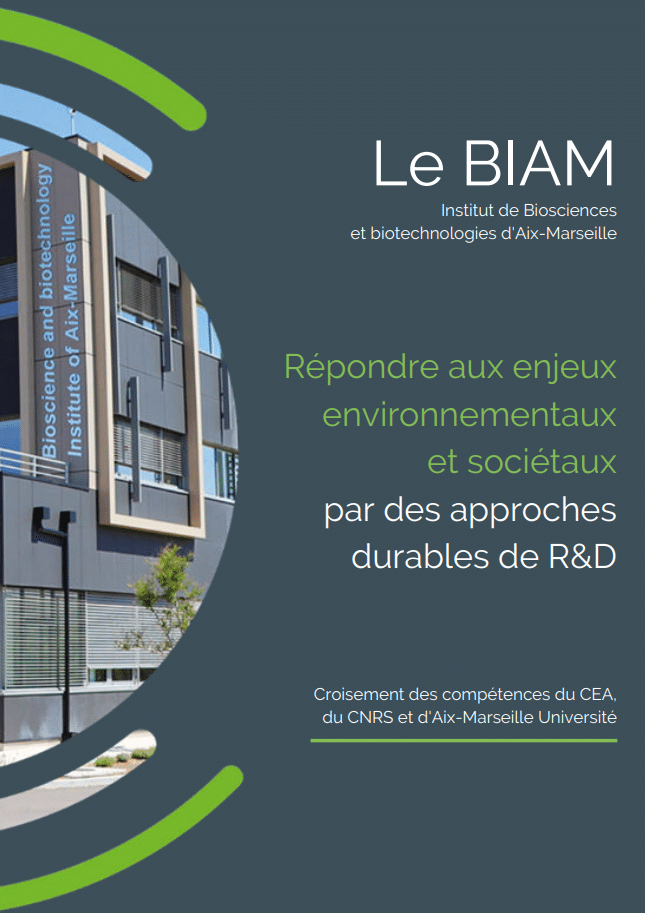MEM

Environmental and Molecular Microbiology Our objectives The Molecular and Environmental Microbiology (MEM) team is international, composed of researchers and students from several countries, with different and complementary scientific backgrounds. MEM is organized in three groups focusing on: Radiation-resistant bacteria and their responses and adaptation mechanisms to radiation and oxidative stress Metal uptake and the study […]
LGBP Research Themes

Research Topics Our objectives Structure and function of photosytems Stefano CAFFARRI, Rainer HIENERWADEL, Aurélie CREPIN. A particularity of photosynthetic organisms is their ability to use solar energy to produce complex organic compounds from simple inorganic molecules. In particular, Photosystem II and Photosystem I are important enzymes where the absorption of light and the first steps […]
LGBP publications

LGBP Publications
LGBP team

Team LGBP Team Leader(s) Stefano CAFFARRI Team ManagerProfessorAMU Ben FIELD Deputy managerResearch DirectorCNRS Benoît MENAND Deputy managerResearch DirectorCNRS Permanent positions Denise ARAGNOL ProfessorAMU Patrice CRETE Associate ProfessorAMU Rainer HIENERWADEL ProfessorAMU Hélène JAVOT Research DirectorCEA Christophe LALOI ProfessorAMU Marie-Hélène MONTANE ResearcherCEA Christophe ROBAGLIA ProfessorAMU Pascaline AUROY- TARRAGO EngineerCEA Cécile LECAMPION-TERESE EngineerAMU Clément BELBACHIR TechnicianAMU Muriel REISSOLET […]
LGBP

Luminy Plant Genetics and Biophysics team – LGBP How do plants regulate their growth? From photosystem dynamics to signalling pathways The LGBP develops interconnected and interdisciplinary projects that form a continuum from the dynamics of light-collecting photosystems to stress signalling inside and outside the chloroplast that regulate plant growth. Our model organisms are the flowering […]
LEMIRE Publications

LEMIRE Publications
LEMIRE team and skills

Team LEMIRE Team Leader(s) Wafa ACHOUAK Team ManagerResearch DirectorCNRS Catherine SANTAELLA Deputy managerResearch FellowCNRS Permanent positions Thierry HEULIN Research DirectorCNRS Johannes STUTTMANN Research DirectorCEA Mohamed BARAKAT Research engineerCNRS Gilles DE LUCA Research engineerCNRS Marie-Ange PALOMARES EngineerCEA Adeline ARMELIN TechnicianCEA Sylvain FOCHESATO TechnicianCEA Fixed-tern contracts and students Ivan ALEKSIEIENKO PhD student Anaïs BLACHE PhD student Tom […]
LEMIRE databases

Database Metadata analyses and bacterial regulatory systems databases To carry out our work, bioinformatics tools are used/developed at LEMiRE for metadata analysis, in silico studies, genome mining and creation of regulator databases. Databases : Rapid changes in the physico-chemical conditions of the environment of bacteria require an adjustment of their physiology that may involve a […]
LEMIRE research themes and projects

Research topics Plants have co-evolved with their microbiota for more than 300 million years. The whole genome of this microbiota (microbiome) is an extension of the host plant genome (holobiont). The interactions between the host and its microbiota rely on sophisticated ways to communicate and coexist. Complex, interconnected networks of signals and metabolites modulate the […]
LEMIRE

Pseudomonas brassicacearum – Expression de l’ARN non codant rsmW Previous Next Team Microbial Ecology of the Rhizosphere Research on soil-plant-microbiota interactions Adaptive strategies and exploration of phytobeneficial bacterial genomes for a sustainable agriculture Research at LEMiRE is devoted to the study of the “soil-plant-microbiota interactions”, with a particular focus on the potential role of the […]